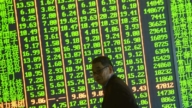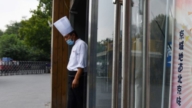【新唐人2014年05月02日訊】日前,中共廣西南寧發佈房市「限購」調整文件,打響了官方首次正式鬆綁限購令的第一槍。那麼,房市限購令鬆綁的目地是甚麼?在中共為保經濟增長,不斷加大投入的情況下,這些措施會使走低的房價再一次被推高嗎?來聽聽專家的分析。
據大陸官媒報導,廣西壯族自治區南寧市住房保障和房產管理局,4月28號發佈調整房市限購文件,從25號起,廣西北部灣經濟區內的5個周邊城市的戶籍居民,可參照南寧市戶籍居民家庭政策,在南寧市內購買2套房。
報導指出,這是第一份由官方正式公布的房市「限購」調整文件。打響了正式鬆綁限購令的第一槍。
早前,大陸已傳出溫州、長沙等城市醞釀鬆綁限購,但都只是傳言。而繼杭州蕭山鬆動了購地保證金後,29號,天津濱海新區也傳出將實施差別化限購。
大陸金融分析師任中道:「因為樓市現在就是關乎地方政府的利益,各個地方的政府都在醞釀著出手救市呀、鬆綁呀,對那些契稅進行優惠返還,各種各樣的所謂的措施都在醞釀當中,那有人就已經發文說,正式的作為一個鬆綁的這個文件下發。」
2010年4月30號,中共頒布《國十條》推出限購令來調控房價。此次限購令鬆綁,不少大陸權威人士認為中央政府已經放棄房市調控政策,這也代表大陸打房政策正出現巨變。
大陸金融分析師任中道表示,由於樓市直接牽扯地方經濟、銀行系統、金融系統,包括民間借貸這些直接關乎中共政府的利益,中共就會想方設法採取一些變通的方式出手救市。
美國《彭博商業週刊》4月25號報導,浙江寧波奉化最大發展商「興潤置業」因債務問題面臨破產。文章引述「聯昌國際研究」公司(CIMB Securities Research)地產分析師(Johnson Hu)的話說,隨著信貸收緊,會有更多像「興潤置業」這樣的發展商倒閉。
中共總理李克強暗示,「只要沒有系統性地區風險,政府就不會干預太多,因為發生一些違約情況是無可避免的。」
美國「南卡羅萊納大學艾肯商學院」教授謝田表示,中共總理的暗示,並不是指中共政府就完全放棄了干預和完全放棄了救市,或任由市場行為來自己調節。
美國南卡羅萊納大學艾肯商學院教授謝田:「而實質上中央政府已認識到房地產泡沫的規模已經太大太大,救也沒辦法全救,不救也不行。不管是廣西南寧,或者是浙江奉化,只要它不是那種有全局性的、不是一線城市那種非常有政治風險很強的,它很可能就讓他們破產、或讓他們違約。」
天津、南寧的二三線城市出現房市限購令鬆綁,上海「同策房產諮詢」研究部總監張宏偉向媒體表示,這是為了去庫存的壓力。
而謝田認為,更有可能的是,地方政府為保護自己所採取的一個舉措。
任中道表示,各地政府除面臨負債壓力外,還不斷的有新盤在入市。
任中道:「如果這個量價齊跌,資金不能回籠,房企的資金鏈也容易斷裂,同樣會給當地經濟、金融系統造成衝擊。」
4月中旬,中共統計局宣佈了今年第一季度的國內生產總值GDP增長數據為7.4%。中共總理李克強表示,政府目前不會訴諸任何大規模刺激政策, 但政府已經準備好支撐經濟增長,並確保完成全年目標。
任中道表示,4月份以來,中共動作不斷,政治局開會、國務院也開會,實際上出臺了各種各樣的刺激措施保增長。
那麼,這些措施,會使最近走低的房價再一次被推高嗎?
謝田:「現在沒有推高的動能。一個是房地產的泡沫、股市的泡沫﹔一個是中共政府多發的貨幣、多投入的貨幣,還有一個是海外的熱錢,這三個來源都在枯竭、都在減少。」
任中道:「房價還會走低,海外融資由於人民幣的貶值,困難越來越大,成本也越來越大,銀行也收緊(房地產)的貸款。」
任中道表示,到5月份,超過千億規模的信託業將到期,那時對房企的資金鏈會有更大的衝擊。所以,採取最好的方法還是繼續降價。
採訪編輯/易如 後製/周天
Will House Prices Rise by Removing the House Purchase Limit?
Recently, the Chinese Communist Party (CCP) authorities
in Nanning City, Guangxi Province released a document
revising the Housing Purchase Restriction (HPR) policy.
It is the first official move to relax the house purchase limit.
What is the purpose of relaxing HPR?
The CCP is trying to maintain economic growth and
keep bolstering investment.
Will these measures halt the collapsing house prices?
According to China’s official media, on April 28
the Housing Authority and Real Estate Management Bureau
of Nanning City of Guangxi Province released a document
to free up housing market purchase restrictions.
Starting from April 25, residents of five surrounding cities
of Guangxi Beibu Gulf Economic Zone may
buy two suites in Nanning City, the same as residents of Nanning.
The report indicated that this was the first official announcement
on adjusting the housing market restrictions,
a signal of an officially move to deregulate HPR.
There were rumors earlier about removing HPR in
Wenzhou, Changsha and other cities.
After the adjustment to the land purchase deposit policy
in Songshan, Hangzhou, on April 29,
it is said that Binhai New Area in Tianjin will implement
conditional HPR.
Chinese Financial Analyst Ren Zhongdao:
“The real estate market is the interest of local governments.
They are preparing to bailout, relax on regulations,
provide return on interest and a variety of measures.
Now someone has already formally started to relax the HPR."
On April 30, 2010 the CCP issued the “Ten Rules"
introducing HRP to control house prices.
Many experts in China believe that the deregulation now
signals that the CCP authorities has abandoned HPR
and that China’s housing policy is undergoing big changes.
Ren Zhongdao indicated that real-estate is directly related to
the local economy, banking systems, financial systems and
private lending,
all of which are directly related to the interests of the CCP
government.
The CCP hence takes alternative ways to bailout the housing
market.
US Bloomberg Businessweek reported on April 25,
the largest developer “Xingyun Real-Estate" in
Fenghua, Ningbo City, Zhejiang Province
is facing bankruptcy because of debt problems.
The article quoted CIMB Securities Research
Real-estate analyst Johnson Hu
as saying that with the tightening of lending,
more developers like Xinyun will go bankrupt.
Chinese Premier Li Keqiang hinted, “The government
will not interfere much if there is no systematic risk.
Some defaults are inevitable."
USC Aiken School of Business Professor Xie Tian said that
the Chinese Prime Minister』s hint does not mean that the CCP
government has completely abandoned intervention,
or completely abandoned the bailout, or allows the market
to regulate itself.
Professor Xie Tian: “The central government has recognized
that the scale of the real-estate bubble is too much.
There is no way to save it, but it won’t do not to save it.
Whether Nanning in Guangxi or Fenghua in Zhejiang,
as long as they do not impact the overall system,
and they are not the first-tier cities with strong political risk,
it is feasible to let them go bankrupt or default."
After the second and third tier cities of Tianjin and Nanning
relaxed on HPR,
Shanghai “Tongce Real-estate Consulting"
Research leader Zhang Hongwei told the media
it was to release the pressure on inventory.
Xie Tian thinks it is more likely that
local governments are using these measures to save themselves.
Ren Zhongdao incidated that local governments face the issue
of new inventories entering the market as well as default.
Ren Zhongdao: “If both volume and price drop,
money cannot be repaid.
It is likely that real-estate enterprises’ capital chain will break
and hit local economies and financial systems."
In mid-April, CCP Bureau of Statistics announced
that Q1 GDP growth was 7.4 %.
Chinese Premier Li Keqiang said that the government
is not resorting to any large-scale stimulus,
but the government is ready to support economic growth
and to ensure the completion of the annual target.
Ren Zhongdao said that the CCP has been active since April,
such as the Politburo meeting and the State Council meeting.
It introduced a variety of stimulus measures to ensure growth.
So, will these measures push the falling house prices back up?
Xie Tian: “It does not have the power to push up the price.
One reason is the real-estate bubble and the stock market bubble;
another reason is the extra money issued by the CCP government,
the third reason is hot money from overseas.
All these sources are declining."
Ren Zhongdao: “The house prices will continue to fall.
Overseas finance is more difficult due to the Yuan’s
devaluation.
The cost is also growing,and banks are tightening up on
(real-estate ) lending."
Ren Zhongdao said that more than one hundred billion yuan
of trust will come due in May.
It will have a large impact to the real-estate capital chain.
So the best way is to continue to cut prices.
Interview & Edit/Yi Ru Post-Production/Zhou Tian




























